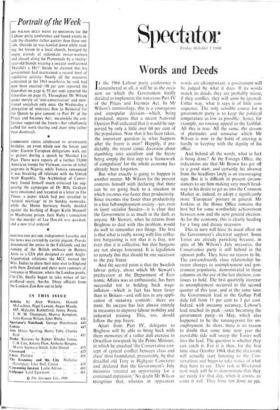Words and Deeds
I F the 1966 Labour party conference is remembered at all, it will be as the occa- sion on which the Government finally decided to implement the notorious Part IV of the Prices and Incomes Act. In Mr Wilson's terminology, this is a courageous and unpopular decision—which, being translated, means that a recent National Opinion Poll indicated that it would be sup- ported by only a little over 60 per cent of the population. Now that it has been taken, the important question is, what happens after the freeze is over? Happily, if pre- dictably. the recent comic diversion about stumbling into socialism and the freeze being simply the first step to a `framework of compulsion' for the whole economy has already been forgotten.
But what exactly is going to happen is another matter. Mr Wilson for the present contents himself with declaring that there can be no going back to a situation in which incomes rise faster than productivity. Since incomes rise faster than productivity in a free full-employment society—yes, even in (just) socialist Sweden—it is clear that the Government is as much in the dark as anyone. Mr Stewart, when he returns from Brighton to deal with this problem, would do well to remember two things. The first is that what is really wrong with free collec- tive bargaining is not that it is free, nor even that it is collective, but that bargains are not always honoured. It is legislation to remedy this that should be one successor to the pay. freeze.
And the second point is that the Swedish labour policy, about which Mr Stewart's predecessor at the Department of Eco- nomic Affairs was so enthusiastic, has been successful not in holding back wage- inflation—which in fact has been faster than in Britain—and still less in any appli- cation of statutory controls : there are none. Its success has lain almost entirely in measures to improve labour mobility and industrial training. This, too, should follow the pay freeze.
Apart from Part IV, delegates to Brighton will be able to bring back with them memories of a rather dull exercise in Orwellian newspeak by the Prime Minister, in which he attacked `the Conservative con- cept of cynical conflict between class and class' (first formulated, presumably, by that dreadful old Tory in Highgate Cemetery) and declared that the Government's July measures `created an opportunity for a continued expansion.' No doubt Mr Wilson recognises that, whereas in opposition words are all-important, a government will be judged by what it does. If its words match its deeds, they are probably otiose; if they conflict, they will soon be ignored. Either way, what it says is of little con- sequence. The only sensible course for a government party is to keep the political temperature as low as possible : hence, for example, no rousing appeal to the faithful. All this is true. All the same, the stream of platitudes and nonsense which Mr Wilson is now in the habit of uttering is hardly in keeping with the dignity of his office.
And behind all the words, what in fact is being done? At the Foreign Office, the indications are that Mr Brown has got off to a good start, and certainly his absence from the headlines lately is an encouraging sign. But it is difficult in present circum- stances to see him making very much head- way in his desire to get us into the Common Market or, indeed, to adopt a significantly more 'European' posture in general. Mr Jenkins at the Home Office remains the best bet for some worthwhile achievement between now and the next general election. As for the economy, this is clearly heading for a long and dreary recession.
This in turn will have its usual effect on the Government's electoral support. Some Tories are already panicking because, in spite of Mr Wilson's July measures, the Conservative party is still behind in the opinion polls. They have no reason to be. The extraordinarily close relationship be- tween changes in unemployment and gov- ernment popularity, demonstrated in these columns on the eve of the last election, con- tinues to hold. The first quarterly increase in unemployment occurred in the second quarter of this year, and at the same time the Government lead in the Gallup Poll duly fell from 11 per cent to 3 per cent. Indeed, with uncanny accuracy, Labour's lead reached its peak—since becoming the government party—in May, which also happened to be the turning-point for un- employment. In short, there is no reason to doubt that some time next year the inevitable tide will sweep the Tories well into the lead. The question is whether they can catch it. For it is then, for the first time since October 1964, that the electorate will actually start listening to the Con- servatives and begin to take notice of what they have to say. Their task at Blackpool next week will be to demonstrate that they are ready for that day, when it comes, as come it will. They have not done so yet.


































 Previous page
Previous page